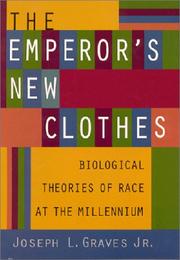| Listing 1 - 6 of 6 |
Sort by
|
Book
ISBN: 0128232633 9780128232637 9780128221051 0128221054 Year: 2022 Publisher: Amsterdam, Netherlands ; Oxford, England : Elsevier,
Abstract | Keywords | Export | Availability | Bookmark
 Loading...
Loading...Choose an application
- Reference Manager
- EndNote
- RefWorks (Direct export to RefWorks)
Principles and Applications of Antimicrobial Nanomaterials introduces the reader to the microbial world, antimicrobial nanomaterials, how microbial evolution works, and how knowledge of these areas can facilitate the development of sustainable antimicrobials. Due to the widespread occurrence of multidrug-resistant microbes, there is an increasing interest in the use of novel nanostructured materials as antimicrobials. This book is designed to help researchers from fields such as materials science, nanoscience, and nanoengineering who are attempting to develop these antimicrobial materials.
Anti-infective agents --- Technological innovations. --- Therapeutic use. --- Antiinfective agents --- Antimicrobial agents --- Antimicrobial drugs --- Antimicrobials --- Drugs --- Nanostructures --- Anti-Infective Agents --- Microbiological Phenomena --- therapeutic use

ISBN: 081352847X Year: 2001 Publisher: New Brunswick (N.J.) : Rutgers university press,
Abstract | Keywords | Export | Availability | Bookmark
 Loading...
Loading...Choose an application
- Reference Manager
- EndNote
- RefWorks (Direct export to RefWorks)
Physical anthropology. --- Race. --- Racism in anthropology. --- Sociobiology.
Book
ISBN: 9780231553735 Year: 2021 Publisher: New York, NY
Abstract | Keywords | Export | Availability | Bookmark
 Loading...
Loading...Choose an application
- Reference Manager
- EndNote
- RefWorks (Direct export to RefWorks)
Book

ISBN: 9780231206570 9780231206563 Year: 2023 Publisher: New York : Columbia University Press,
Abstract | Keywords | Export | Availability | Bookmark
 Loading...
Loading...Choose an application
- Reference Manager
- EndNote
- RefWorks (Direct export to RefWorks)
"Currently scholarship on science and religion covers a range of topics, including religious responses to scientific and technological developments, methodological approaches to the study of science and religion, and normative proposals for the relationship between the categories. Despite this breadth, the field typically frames important questions of human existence as abstract philosophical and theological inquiries. But what if these are not two distinctly separate categories ? Can science and religion scholarship become more public-facing and speak directly to the social and political issues that shape our everyday lives ? With Critical Approaches to Science and Religion, Myrna Perez Sheldon, Ahmed Ragab, and Terence Keel argue that this is possible when perspectives from three areas of critical theory-critical-race theory, feminist and queer theory, and postcolonial theory-are brought to bear on the field. By engaging with these critical theories, scholars would be better able to account for how histories of empire, slavery, and patriarchy have shaped science and religion in modern times. Developing this critical historical perspective would, in turn, enable science and religion scholarship to speak meaningfully to contemporary political issues including climate change, immigration, healthcare, reproductive justice, and sexual identity. The book seeks to reframe the study of science and religion such that those who engage with its scholarship will be better positioned to explore questions such as: should religious communities be exempt from government mandated healthcare provisions based on health science ? Should religious leaders make public claims about the status of life and personhood in reaction to changing reproductive an genetic technologies ? Are indigenous communities obligated to believe the Out of Africa hypothesis developed by Euro-American biologists ? The intent of these and similar questions is to encourage an approach to the study of science and religion that more fully addresses the lied realities of contemporary communities around the globe"--
Religion and science. --- Religion --- Critical race theory --- Feminist theory --- Postcolonialism --- Queer theory --- Religion et sciences. --- Théorie critique de la race --- Théorie féministe --- Postcolonialisme --- Théorie queer --- Philosophy --- Philosophie
Book

ISBN: 9780231156967 9780231156974 9780231527699 Year: 2011 Publisher: New York, NY
Abstract | Keywords | Export | Availability | Bookmark
 Loading...
Loading...Choose an application
- Reference Manager
- EndNote
- RefWorks (Direct export to RefWorks)
Continental Population Groups --- Evolution, Molecular. --- Genetic Variation. --- Genetics. --- Human population genetics. --- Race.
Book

ISBN: 9780813561387 Year: 2013 Publisher: New Brunswick, NJ
Abstract | Keywords | Export | Availability | Bookmark
 Loading...
Loading...Choose an application
- Reference Manager
- EndNote
- RefWorks (Direct export to RefWorks)
| Listing 1 - 6 of 6 |
Sort by
|

 Search
Search Feedback
Feedback About UniCat
About UniCat  Help
Help News
News